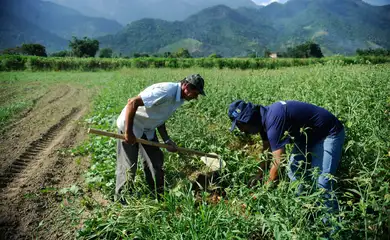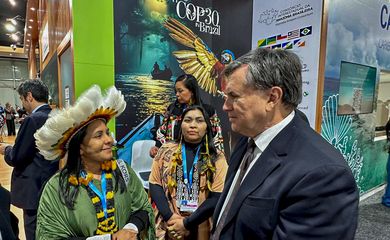G20: Brazil champions agroecology in climate transition

After reducing greenhouse gas emissions by 12 percent in 2023, Brazil has a tool with the potential to further reduce the release of carbon dioxide into the atmosphere. With around 28 million hectares of degraded pastures, the country can use these areas to increase food production without cutting down a single tree.

In a plenary session on sustainable development, climate change, and ecological transition at the G20 Social, a parallel event to the G20 Leaders’ Summit, Brazil’s Minister of Agricultural Development Paulo Teixeira highlighted the role of technology in converting Brazil’s agricultural model from traditional agriculture to agroecology. He emphasized the investments the government has made in low-carbon agriculture.
“From Brazil’s point of view, agriculture will make decisive contributions [to reducing gas emissions]. First, we are reducing deforestation. Second, we are promoting regenerative agriculture, which recovers the environment rather than destroying it. Recovering degraded pastures for agriculture means recovering carbon credits,” Minister Teixeira stated.
In his view, Brazilian agriculture needs investment in technology and science to change the base of chemical supplies and pesticides in favor of an activity based on bioeconomy and agroecology. “We have the science, we just need to bring it to the frontlines,” he said.
In addition to investment, the minister advocated restricting credit to producers who deforest the Amazon. “We need to call bank managers in the Amazon and ask them to stop granting credit to low-quality agriculture. They have to finance agriculture with higher productivity, one that recovers the forest,” he argued.
Investment
The minister listed a series of figures showing the increase in federal investment in agricultural development and family farming. According to Minister Teixeira, in the last four months, investment has risen by 30 percent in organic farming, 40 percent in productive forests, and 50 percent in the bioeconomy. The growth, he pointed out, came after changes to the rules of the National Program for Strengthening Family Farming.
He announced that he had presented a BRL 1.5 billion project for the Amazon Fund, which was reactivated last year, aimed at agroforestry cooperatives. They will receive technical assistance to modernize practices in the Amazon. “We need to stop using fire to manage agriculture and introduce more advanced techniques. We want to plant food and ‘plant’ water by bringing a degraded area back to life,” he said. His words were met with applause from the audience.
The minister further announced a 20 percent surge in the mechanization of family farming, a 30 percent rise in funding for young family farmers, and a 40 percent increase for women family farmers. The minister also announced investments in traditional communities, with the purchase of BRL 32 million worth of agroecological products from quilombola communities via the National Supply Company (CONAB).




